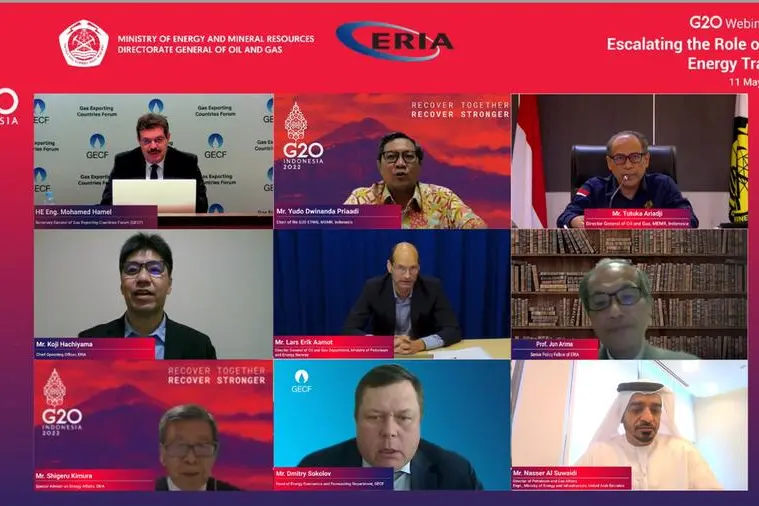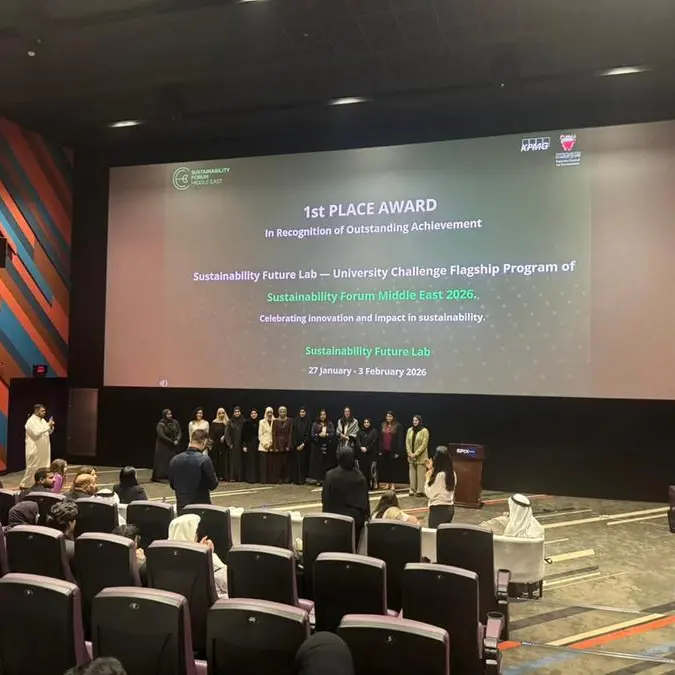PHOTO
Doha, Qatar: The upcoming G20 Energy Ministerial under the Presidency of Indonesia signals an opportunity to emphasise the soaring role of natural gas in satisfying growing energy needs of G20 and recognise importance of natural gas for the World when “recover together – recover stronger”.
Delivering a keynote at a G20 Webinar Event on Wednesday, 11 May 2022, on ‘Escalating the Role of Gas in Energy Transition’ via videoconference, HE Eng. Mohamed Hamel drew the attention of senior G20 and Southeast Asian energy experts that natural gas offers the balanced solution that the world seeks to achieve sustainable development goals in line with the United Nations 2030 Agenda and the Paris Agreement.
The increasing pace of global energy transitions and advancement of modern technologies, which unleash great potential of natural gas as a viable fuel, to enhance global energy security, eradicate energy poverty, and build flexible, resilient and sustainable energy systems, in synergy with other energy sources.
Natural gas has a crucial role in satisfying growing energy needs, whilst contributing to air quality improvement and climate change mitigation; its share in the global energy mix is expected to increase from 23% to 27% by 2050.
“The growing global needs for natural gas can only be met if investments are made in a timely manner. To this end, the GECF calls for policy support, stability and predictability,” he asserted.
Citing figures from the GECF Global Gas Outlook 2050, the official said upstream investment requirements in natural gas amounts to $7.5 trillion, an enormous amount of funding especially since the GECF expects nearly 75% of global gas output in 2050 to come from new projects.
According to him, technologies that lead to promising energy carriers such as hydrogen or decarbonise gas such as carbon capture, utilisation and storage (CCUS) need a policy push but also “the transfer of experience and best practices to help the developing world.”
Turning to South East Asia, one of the most populous regions of the world with an increasing appetite for gas over coal, HE Hamel noted that gas demand in the region is expected to more than double to 350 bcm by 2050. Power generation will be the main driver for natural gas, as electricity demand will almost triple, propelled by urbanisation, rising income and cooling requirements.
“The continuing development of LNG-to-power supply chains and interconnectivity will be key factors, facilitating the lure of LNG into the region that will bridge the widening gap between gas production and growing demand.”
On behalf of the GECF, HE Hamel also congratulated ERIA for establishing the Asia CCUS Network and expressed the readiness to cooperate with this collaborative platform.
The event was jointly held by Indonesia’s Ministry of Energy and Mineral Resources (MEMR) and the Jakarta-based Economic Research Institute for ASEAN and East Asia (ERIA) – a partner GECF organisation.
Other presenters at the event included (in speaking order): Mr Yudo Dwinanda Priaadi; Chair of G20 Energy Transition Working Group, Indonesia, Mr Tutuka Ariadji; Director General of Oil and Gas at MEMR, Indonesia, Prof Jun Arima; Senior Policy Fellow and Mr Shigeru Kimura; Special Advisor on Energy Affairs (both ERIA), Mr Lars Erik Aamot; Director General of Oil and Gas Development at Ministry of Petroleum and Energy, Norway, Mr Nasser Al Suwaidi; Director of Petroleum and Gas Affairs Department at Ministry of Energy and Infrastructure, UAE, Mr Dmitry Sokolov; Head of Energy Economics and Forecasting Department, GECF, Mr Rakhmat Asyhari; Executive VP of Oil and Gas, PT PLN , Indonesia, and HE Dr Siri Jirapongphan; Former Energy Minister, Thailand.
Norway, Malaysia and the UAE are Observer Members of the GECF. Indonesia was one of the Founder Members of the GECF. It is the 2022 President of the G20.
Event proceedings can be watched on https://www.youtube.com/watch?v=IGf6Be7IVKg
-Ends-
For further information, kindly contact:
Nadezhda M. Lyubovskaya
nadezhda.lyubovskaya@gecf.org
Sarmad Qazi
sarmad.qazi@gecf.org
About Gas Exporting Countries Forum:
The Gas Exporting Countries Forum (GECF) is an international intergovernmental organisation currently comprising of 19 Member Countries: Algeria, Bolivia, Egypt, Equatorial Guinea, Iran, Libya, Nigeria, Qatar, Russia, Trinidad and Tobago, and Venezuela as Member Countries, and Angola, Azerbaijan, Iraq, Malaysia, Mozambique, Norway, Peru, and United Arab Emirates as Observer Members. Together, the GECF Members represent 71% of the global proven gas reserves, 42% of marketed production, 53% of exports by pipeline and 55% as LNG.
The GECF is headquartered in Doha, Qatar.
www.gecf.org
Twitter.com/GECF_News
Linkedin.com/company/gecf-news/




















